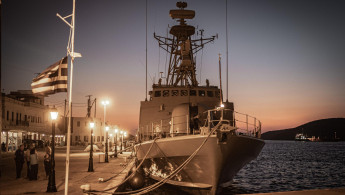Turkey, Greece plan rival exercises in tense east Mediterranean
The discovery of major deposits in waters surrounding Cyprus and the Greek island of Crete has triggered a scramble for energy riches and revived old regional rivalries.
Tensions ratched up another notch when Turkey sent the Oruc Reis research vessel accompanied by warships to disputed waters on August 10.
Greece and its EU ally France both dispatched their own naval assets to the area to monitor Turkey's work.
EU foreign ministers convened an emergency videoconference on the emerging crisis when a Turkish frigate collided with a Greek one in disputed circumstances days into the Oruc Reis mission.
Germany has taken the lead in trying to calm a dispute that threatens to complicate EU nations' efforts to tap new sources of energy that can reduce their dependence on countries such as Russia.
Its foreign minister, Heiko Maas, will visit Athens and Ankara on Tuesday to try to put talks between the two rivals back on track.
But the difficulties became even more apparent when Athens and Ankara announced plans to stage sea exercises in the same region south of Crete on Tuesday.
The Greek exercises appeared to have been announced in response to Turkey's decision to extend the Oruc Reis mission by an extra four days to Thursday.
Turkey's defence ministry responded by planning its own "maritime trainings... to promote coordination and interoperability" south of Crete at the same time.
No step back
Neither side appeared ready to defuse the tension.
|
|
Turkish President Recep Tayyip Erdogan said he might decide to keep the Oruc Reis out at sea even longer and accused Greece of behaving "in an unauthorised and spoilt manner".
"Turkey will not take even the smallest step back from the activities of either Oruc Reis or our naval elements escorting it," Erdogan said after chairing a weekly cabinet meeting.
"With its stance that goes against international law, goodwill and neighbourly relations, Greece has thrown itself into a chaos from which it cannot find a way out," he added.
Maas plans to meet Greek Prime Minister Kyriakos Mitsotakis before flying to Ankara for talks with his Turkish counterpart.
It was not clear from the official statements whether Maas would also be received by Erdogan.
"We take the tensions there very seriously," a German foreign ministry spokesman told reporters.
"We are worried that the tensions could further weigh on the relationship between Turkey and the EU and that further escalation could have grave consequences."
Germany currently holds the rotating presidency of the European Union, and a spokesman for Chancellor Angela Merkel said it was "essential" to remain in dialogue with both sides.
"The aim is for Greece and Turkey to resolve their problems with each other directly," the spokesman said.
Follow us on Facebook, Twitter and Instagram to stay connected





 Follow the Middle East's top stories in English at The New Arab on Google News
Follow the Middle East's top stories in English at The New Arab on Google News
![The UAE is widely suspected of arming the RSF militia [Getty]](/sites/default/files/styles/image_330x185/public/2024-11/GettyImages-472529908.jpg?h=69f2b9d0&itok=Yauw3YTG)
![Netanyahu furiously denounced the ICC [Getty]](/sites/default/files/styles/image_330x185/public/2024-11/GettyImages-2169352575.jpg?h=199d8c1f&itok=-vRiruf5)
![Both Hamas and the Palestinian Authority welcomed the ICC arrest warrants [Getty]](/sites/default/files/styles/image_330x185/public/2024-11/GettyImages-2178351173.jpg?h=199d8c1f&itok=TV858iVg)